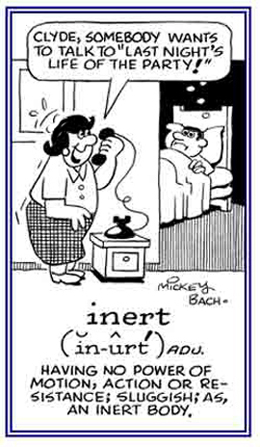You searched for:
“inert”
inert (adjective), more inert, most inert
1. Characteristic of someone or something being unable to move or to act; inanimate: Susan couldn't use her hand, which was inert after having broken her wrist, and which was put into a cast by the doctor.
2. A reference to a person or an animal being sluggish in action or motion; lethargic: Debbie seemed to be quite inert and slow in getting up in the morning after sleeping only 3 hours during the night.
3. In chemistry, not readily reactive with other elements; forming few or no chemical compounds: Argon and neon are inert gasses which seemingly don't respond to other substances.
4. Etymology: from French inerte (about the 16th century); from Latin inertem, iners, "unskilled, inactive"; from in-, "without" + ars, artis, "skill".

© ALL rights are reserved.
Go to this Word A Day Revisited Index
2. A reference to a person or an animal being sluggish in action or motion; lethargic: Debbie seemed to be quite inert and slow in getting up in the morning after sleeping only 3 hours during the night.
3. In chemistry, not readily reactive with other elements; forming few or no chemical compounds: Argon and neon are inert gasses which seemingly don't respond to other substances.
4. Etymology: from French inerte (about the 16th century); from Latin inertem, iners, "unskilled, inactive"; from in-, "without" + ars, artis, "skill".

Go to this Word A Day Revisited Index
so you can see more of Mickey Bach's cartoons.
This entry is located in the following unit:
art-, arti-
(page 2)
inert, insert, insert, inset
inert (in URT) (adjective)
1. Very slow, sluggish, lacking the ability to move: Roger was so tired after the marathon, that he felt inert.
2. Pertaining to something which does not have the anticipated reaction, either chemically or biologically: The chemistry formula proved to be inert and not dangerous.
2. Pertaining to something which does not have the anticipated reaction, either chemically or biologically: The chemistry formula proved to be inert and not dangerous.
insert (in SURT) (verb)
To put or to incorporate one thing into the structure of something else: While editing the manuscript, the professor suggested a new paragraph to insert into the text.
insert (in SURT) (noun)
That which is included within the framework of another item: The newspaper had a special insert about the car race.
inset (IN set", in SET) (noun)
A small representation or part which is incorporated into the larger body of an item: There was an inset on the map showing the larger cities.
There was a colorful inset on the insert which the staff put in the programs for the theater performance.
After completing the task of putting 700 inserts into 700 programs, they were so tired that they were totally inert.
This entry is located in the following unit:
Confusing Words Clarified: Group I; Homonyms, Homophones, Homographs, Synonyms, Polysemes, etc. +
(page 2)
A unit related to:
“inert”
(Greek: argus, neutral, inactive, idle, inert; gas)
